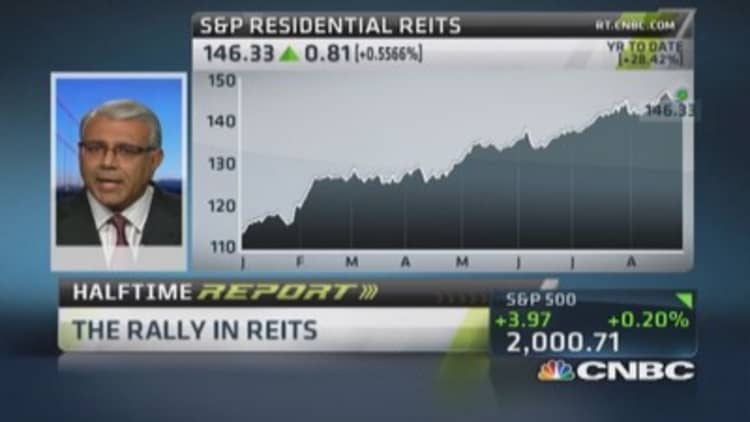
Even as the housing market appears to gain steam, the rental apartment sector is defying expectations.
Rents continue to rise, vacancies fall and investors in apartment stocks are reaping the rewards. Apartment REITs (real estate investment trusts) delivered a year-to-date return of 29 percent as of the close of business Thursday, according to the National Association of Real Estate Investment Trusts. That is more than triple the gains of the S&P 500 and 67 percent better than the gains of the overall REIT market. Apartment REITs are the best-performing REIT sector, with health care a distant second.
"For quite a while the stocks were going nowhere, they were treading water, as people were worried about the looming new supply and wondering if there would be demand," said Calvin Schnure, vice president of research at NAREIT. "What we're seeing is, yes, there is new supply, but the demand is much stronger."
Multifamily construction reached an eight-year high in July, up nearly 50 percent from a year ago, according to the U.S. Census Bureau. Building permits for these apartment structures, an indicator of future construction, are 15 percent higher than a year ago.
"We are not worried about supply," said Alexander Goldfarb, a REIT analyst with Sandler O'Neill. "Right now we have homeownership rates depressed, as renters are still hesitant to move out to buy homes, and thus the demand for apartments continues to grow. Additionally, banks and lenders remain cautious on construction lending, and apartment developers are driven by economics. If they can't make the numbers pencil, they won't build."
Read MoreFlorida condo owners being forced out make plea to governor
Household formation surged in the second quarter of this year, but it was largely rental households. This, as rents gained ever more steam. Rents grew by 3.8 percent in July, as compared with 3.4 percent growth in July of 2013, according to Axiometrics, a Texas-based market research firm. Weak job and wage growth is keeping landlords from raising rents more, even as vacancies fall.
"Effective rent growth has increased for five straight months, but is still a long way from the summer of 2011, when the rate was in the 5 percent range," said Stephanie McCleskey, vice president of research at Axiometrics. "On the other hand, it's becoming more and more likely that 2014 will be the strongest overall year for the apartment market since the recession ended. This is the year of the apartment."
But is it the year of the apartment stock? Clearly the gains in the first half of this year were monumental, and advances like that are not always sustainable long term, especially in real estate.
"Are REITs overvalued?" asked Goldfarb. "Look at interest rates and the 10-year [Treasury]. The Federal Reserve remains focused on wage inflation and homebuying, so we don't see them raising rates anytime in the near future. So, with limited supply and prolonged low rates, REITs continue to look good."
Read MoreUS mortgage volume ekes out gain on tiny drop in rates
The apartment sector was actually underbuilt, between 2008 and 2011, according to Schnure. It is now several million units behind demand. As job growth improves, more young people will move out of their parents' homes and out of roommate situations and rent on their own. Wage improvement will also allow landlords to raise rents even higher.
"Nationally, we have a need for quite a bit more housing," added Schnure.
Builders and developers also seem undeterred by gains in home sales and by rising rents. An index of developer sentiment in the apartment market rose again in the second quarter of this year, still in positive territory for the 10th straight quarter.
—By CNBC's Diana Olick


